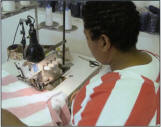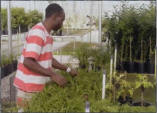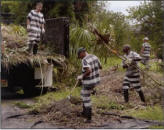The auto body shop is a top-notch facility and serves as a training ground for inmates
with an interest in vehicle body work. From sanding to applying paint, inmates receive
hands-on experience repairing county-owned cars and trucks. Federal grant money
was used to build one of the largest paint spray booths in Manatee County. The use
of this facility and inmate labor has a cost savings of several thousand dollars
each year.
In the carpentry program, inmates learn to apply the full range of carpentry skills
in a well-equipped shop and through on-site experiences. They arc trained in building
construction from layout to the finished product, with an emphasis on safety. Several
buildings located in the vocational training area were designed and built with inmate
labor.
Students are gaining an appetite for learning in the culinary arts program. They
are trained how to properly prepare food, including short order cooking, baking,
and the basics of restaurant management. A commercial-style kitchen, bakery, and
on-site dining room provide employment conditions for the students.<
Custom Garment & Sewing

The LIFE sewing program is multi-faceted and one of the most productive. It began
as the uniform production unit. Appropriately named, inmates were trained on donated
used sewing machines to make clothes. Today, scores of jail uniforms and other garments
are produced each week, saving the Sheriff's Office approximately $160,000 a year.
Top of the line sewing machines arc now used to also create upholstery, sheets,
pillowcases, and other garments.
Diesel Engine Repair
One of the first LIFE programs, the diesel engine repair class provides a foundation
in the operation and repair of diesel engines and other equipment. From tractors
to pick-up trucks, the Sheriff's Office saves thousands of dollars in repair bills,
while at the same time inmates learn a trade. The inmates are provided with experience
comparable to that found in the industry.
Horticulture

Horticulture is one of the largest LIFE programs, and it continues to grow. Students
learn the basics of seeding, propagating, and cultivating plants. The operation
includes more than 10,000 square feet of greenhouses and several acres of growing
areas. In addition to providing plants for county beautification projects, a hydroponics
operation located in one of the greenhouses helps supply the jail with organically
grown vegetables.
Meat Processing
Beef and pork products are processed and packaged in a state-of-the-art facility
that also serves as a training center. Inmates learn meat-cutting skills that enable
them to find jobs in local grocery stores and butcher shops. Approximately 18,000
pounds of meat arc processed in this facility every month.
Video Production

Lights, Camera, Action! Students in this class help to create educational and promotional
videos for the Corrections Bureau, while learning the fundamentals of shooting and
editing video tape. Upon completion of the 12-week course, inmates have the necessary
skills to get an entry-level production job in the television industry.
Welding
Welding classes help spark interest in a promising career path. In this workshop,
inmates receive hands-on training and classroom instruction in a variety of welding
techniques and metal fabrication. Welding students have helped create many of the
metal structures located throughout the correctional complex.
G.E.D.
Sentenced and un-sentenced inmates are encouraged to participate in basic academic
classes that help prepare them for the G.E.D. Classes are taught in a jail computer
lab during the day and evening to accommodate the work schedules of inmates enrolled
in LIFE programs. Many of the inmates receive their high school diploma by the time
they arc released from jail.
Other Areas
Not all inmates who are classified as low-risk qualify for LIFE programs. Many are
put to work in other areas.
- Farming
- Grounds keeping
- Kitchen
- Road Gang
- Maintenance
- Housekeeping/Laundry Services
Future programs are planned, such as a fish farming operation where inmates will
help raise tilapias in fresh water tanks. Tilapia is a fast growing fish that can
weigh up to two pounds. This operation is expected to make a significant impact
on the jail's food budget.